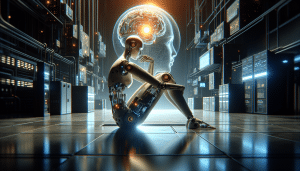Unlocking the Secrets of Quantum Computing for Everyone
Aiden Foster October 22, 2025
Quantum computing is capturing attention across the tech world, promising to revolutionize industries and solve problems that are beyond the reach of classical computers. This guide dives into the basics, latest advances, practical challenges, and real-world potential of quantum computing—designed for curious minds who want to understand how this transformative technology might touch their lives.
Understanding Quantum Computing and How It Works
Quantum computing is a fascinating field rooted in the principles of quantum mechanics. Traditional computers use binary bits (0s and 1s), but quantum computers rely on quantum bits, or qubits, which can exist in multiple states simultaneously. This feature, known as superposition, allows quantum devices to tackle complex calculations at unprecedented speed. Quantum computers can also exploit entanglement, in which two or more qubits become linked and their states interdependent, regardless of distance. These fundamental differences let quantum algorithms explore solutions across a vast computational landscape.
For those just starting to explore quantum computing, it’s natural to feel overwhelmed. Unlike conventional systems where bits are either on or off, qubits can represent a 0, a 1, or both at once. Imagine flipping a coin and trying to calculate all possible paths it might take through a maze at the same time. This is a simple way to visualize how quantum computers operate, making them especially useful for fields like cryptography, modeling molecular structures, and solving optimization problems. This parallelism isn’t just theoretical—it has the potential to dramatically change industries.
The science behind quantum computing is both elegant and perplexing. At its core is the application of quantum principles in engineering to build machines that can solve, for example, mathematical equations faster than any supercomputer. Some researchers are experimenting with quantum gates—building blocks for quantum circuits—to control the state of qubits. Developing the hardware and refining these quantum algorithms is a rapidly evolving field, capturing the interest of both academic and enterprise sectors as they look for ways to harness this disruptive potential. (Source: https://www.nist.gov/topics/quantum-information-science)
Key Benefits and Future Applications of Quantum Technology
Quantum computing holds enormous promise for data analysis, artificial intelligence, healthcare, and more. With its advanced processing capabilities, quantum technology excels at rapidly sifting through massive datasets, pattern recognition, and factoring large numbers. This means breakthroughs in drug discovery, optimization of logistics, and the development of safer encryption systems could become a reality. Quantum simulations promise to revolutionize chemistry by modeling molecular interactions with pinpoint accuracy—something traditional computers struggle to achieve.
The implications of widespread quantum computing reach far beyond science labs. In climate modeling, quantum algorithms could analyze environmental patterns and predict outcomes with greater precision. The financial sector looks to quantum computing for risk modeling, fraud detection, and portfolio optimization that goes beyond linear calculations. Early pilots in machine learning show quantum computers might one day train AI models much more efficiently, fostering smarter, faster decision-making across industries. This technological leap is fueling research and intense competition globally.
The list of potential applications is ever expanding. Scientists are exploring how quantum computers might improve supply chain efficiency by tackling complex routing problems. In cybersecurity, quantum-resistant algorithms are under development to ensure data privacy in a future where current encryption could be cracked by powerful quantum machines. From personalized medicine to next-generation sensors, quantum technologies are poised to reshape countless sectors. The race to unlock these benefits has sparked both hope and debate about the best ways to realize quantum’s true potential. (Source: https://www.ibm.com/quantum-computing/what-is-quantum-computing/)
Main Challenges in Developing Quantum Computers
Despite the buzz, quantum computing development faces significant obstacles. Building stable qubits that can function reliably at scale is one of the field’s greatest challenges. Qubits are notoriously sensitive to their environment, with tiny amounts of heat, radiation, or vibration potentially introducing errors. This fragility means engineers must employ advanced error correction protocols and operate quantum processors at extremely low temperatures—sometimes fractions of a degree above absolute zero. The science is fascinating, but the technical hurdles are real.
Another hurdle is decoherence, which describes how qubits lose their quantum state due to environmental interference. Preserving the delicate state of superposition or entanglement over time is critical for accurate computations, but difficult to achieve. Quantum systems also require highly specialized equipment, such as cryostats and electromagnetic shielding, to isolate them from any outside noise. This makes quantum hardware expensive and forces researchers to continually innovate new materials and designs.
On top of these engineering barriers, software for quantum computers is still in its infancy. Quantum algorithms differ significantly from classical ones and often require entirely new programming languages and logic. Bridging the gap between classical and quantum systems through hybrid algorithms is an area of active research. Industry leaders, academic institutions, and startups are working together to conceptualize and test the next generation of software tools—an important step for bringing quantum computing closer to practical use. (Source: https://www.nature.com/articles/d41586-020-03434-7)
Quantum Computing’s Impact on Data Security and Cryptography
The influence of quantum computing on security stretches into the core of encryption. Many current encryption standards depend on the difficulty of factoring large numbers—a task traditional computers can’t solve quickly. Yet quantum computers threaten to upend these protections with algorithms, such as Shor’s algorithm, that can factor large numbers exponentially faster. Awareness of this vulnerability is causing researchers and organizations to develop quantum-resistant cryptographic methods to secure sensitive data for the future.
The concept of quantum key distribution (QKD) is another exciting application in secure communications. QKD uses quantum mechanics principles to distribute encryption keys, making it almost impossible for an eavesdropper to intercept information without leaving a detectable trace. Some financial institutions and government agencies are experimenting with QKD, seeing it as a pillar of next-generation cybersecurity infrastructure. This shift demands adaptation on a broad scale and underscores the urgent push for new standards that balance security with the potential power of quantum devices.
Preparing for the post-quantum era is not just a technical matter—it is a policy challenge. Standards bodies like NIST have begun a process to evaluate and select algorithms capable of withstanding quantum attacks, and international collaborations are growing. The timeline for quantum computers that can actually break real-world encryption is uncertain, so the transition to post-quantum cryptography is underway even as the technology itself evolves. Staying ahead means staying alert. (Source: https://csrc.nist.gov/projects/post-quantum-cryptography)
Exploring How to Learn More about Quantum Computing
The resources for learning quantum computing are more accessible than ever. Some universities offer free online courses in partnership with educational platforms, giving students—and lifelong learners—practically guided exposure to quantum algorithms and real quantum programming environments. Open-source toolkits, like Qiskit or Cirq, let individuals experiment with quantum code using simulators and, in some cases, access to real quantum hardware via the cloud. This hands-on approach demystifies quantum concepts and lowers entry barriers for new learners.
Publications, interactive textbooks, and academic research articles dive deeper into quantum principles, hardware design, and technical advances. For those looking for structured curricula, universities and nonprofit organizations curate diverse resources—ranging from introductory modules to advanced theoretical discussions. Communities of quantum enthusiasts are thriving in online forums, making it easy to ask questions, share insights, and collaborate on projects around quantum software and hardware.
Large technology companies and government agencies support numerous outreach initiatives. For example, IBM and Google’s quantum development platforms provide free access to resources for students, educators, and hobbyists. Many national laboratories also offer ongoing webinars, hackathons, and informational materials to broaden awareness and encourage responsible innovation. No matter the skill level, there is a path toward greater quantum fluency. (Source: https://quantum-computing.ibm.com/)
Building a Quantum-Ready Future and Navigating Change
The move toward a quantum future requires careful planning and broad-based collaboration. Adoption won’t be instant; instead, it will involve incremental change, experimentation, and adaptation. Companies across the globe are investing in quantum research and preparing strategic roadmaps that think beyond current limitations. Universities are revamping computer science programs to include quantum information science, ensuring the workforce of tomorrow is equipped to understand and leverage these new tools. Such collaborations guide the responsible growth of this promising technology.
Among leading sectors, finance, healthcare, and logistics are embracing pilot projects that test quantum algorithms in real-world scenarios. This helps companies uncover practical benefits while managing risk. There’s also ongoing dialogue around the ethical use of quantum computing. Decision-makers discuss how to ensure advances benefit all of society, not just a select few. As research expands, thoughtful policies and sustainable industry standards become essential in maximizing benefit and minimizing unintended harm.
For individuals and organizations alike, staying informed is the best way to prepare. Tracking developments, attending events, and connecting with expert communities ensures adaptability in face of technological disruption. Future breakthroughs in quantum computing will depend not just on science, but on an ecosystem of informed, engaged participants. Quantum readiness means readiness for change—a challenge as well as an opportunity for society as a whole. (Source: https://www.nature.com/articles/d41586-021-01376-9)
References
1. National Institute of Standards and Technology. (n.d.). Quantum Information Science. Retrieved from https://www.nist.gov/topics/quantum-information-science
2. IBM. (n.d.). What is quantum computing? Retrieved from https://www.ibm.com/quantum-computing/what-is-quantum-computing/
3. Castelvecchi, D. (2020). Why quantum computers are so hard to build. Nature. Retrieved from https://www.nature.com/articles/d41586-020-03434-7
4. National Institute of Standards and Technology. (n.d.). Post-Quantum Cryptography. Retrieved from https://csrc.nist.gov/projects/post-quantum-cryptography
5. IBM Quantum. (n.d.). The IBM Quantum Experience. Retrieved from https://quantum-computing.ibm.com/
6. Castelvecchi, D. (2021). Quantum computing: The great challenge of the century. Nature. Retrieved from https://www.nature.com/articles/d41586-021-01376-9








